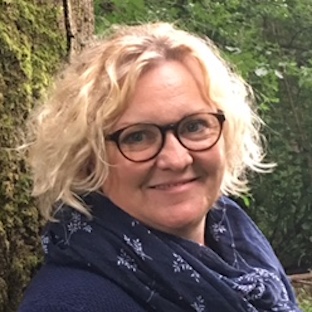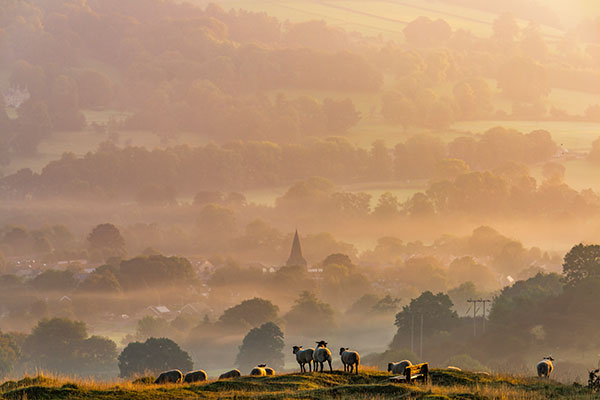The Bike Tour is emblematic of the Commission’s intentions to talk to people in rural communities around the UK about what matters to them. FFCC researchers, and sometimes other companions, are travelling the UK by bicycle to meet people, as they go about their everyday lives, to find out what matters to them about food, farming and the countryside.
Taking place over six months from April to October 2018, the UK-wide Tour is travelling to all parts of the country. At its simplest, it is an eye-catching, attention-grabbing, literal and metaphorical vehicle for engaging and involving the public around the UK, and particularly in rural communities. But it also does much more.
It is notoriously difficult to do good citizen and community engagement and especially in rural communities. Towns and villages are geographically dispersed; public transport is poor; digital connectivity is patchy. These communities are not easily found through traditional public engagement processes - inviting people to ‘focus groups’ or ‘town hall’ meetings. What’s more, so much conventional public engagement follows fundamentally the same patterns. Citizens are invited into ‘organisational’ spaces, and required to adopt organisational speech and behavioural conventions – sitting round tables, or in circles, using unfamiliar language, engaging in strange practices – such as writing on post it notes, or flip charts. Sometimes this can work very well. It’s how many large and small group processes are designed. But there’s no getting away from the fact that it sets up a particular power dynamic, tipped in favour of the ‘consulting’ body. And when it doesn’t work, it’s not unusual to ‘blame’ the citizens – calling them “hard-to-reach”…
There’s no such thing as hard to reach groups; there’s just badly designed processes.
By getting on a bike and going to where people are, mainly by invitation but otherwise simply through showing up out of interest and curiosity, we hope that we demonstrate - by this simple act - that we are serious about involving the broadest cross section of citizens and communities in our work. Going some way towards addressing the power issues implicit in so many participatory processes, we are leaving behind the conventional symbols of organisations – the meeting rooms, the power-point presentations, the discussion papers...
We have reached out to RSA Fellows; we are collaborating with the WI, with young farmers, with civic society organisations - groups steeped in deep knowledge of their communities - asking them to show us around, about who we should meet, what we should see, what we need to understand. We will be showing up in high streets, supermarkets, farmers markets, livestock markets, schools, sheltered housing, health centres, community centres, workplaces and the pub. We are meeting people where they are, to talk to people about what matters to them, about where they live and work, in language that is simple, straightforward and familiar.
On the bike, we will carry our ‘engagement tools’ – cameras, iPads, and audio recording. We will use digital tools to capture responses to simple questions, but we will also invite and encourage people to record themselves or talk to camera. Researchers will wear GoPro to record what they see when they travel, and we will upload the images on to a UK map so people can track where the bike has been and where it’s going next. This alone will enable us to create a vivid picture of the rich diversity and complexity of UK rural communities and countryside (and urban settings too when we pass through). We will tweet, Instagram, vlog and blog the story as we go, as well as collect the responses to feed into the evidence gathering for the Commission.
The bike tour is in the rich tradition of anthropological research; it utilises ethnographic methods and sits squarely in the participatory - even emancipatory - practice space, enabling people to speak their truth directly. It is novel, innovative and involves citizens creatively and extensively, which is at the heart of the FFCC mandate.
Since we’ve been describing and developing this idea, it has captured people’s attention. The response has been overwhelmingly positive. And it is connecting us up with other researchers in the UK and around the world, working in the same tradition. This delicious connectivity brings surprising and enriching perspectives. Through the connecting power of Twitter, I enjoyed a brief exchange with Cormac Russell, Director of the ABCD Institute, and former government advisor on community capacity building, who has published a lovely blog on Asset Based Community Development (ABCD) a concept with which he’s been working for twenty years (nearly as long as me!)
From his blog he says:
“Imagine how different things would be if well intentioned helpers took care to first discover
- The informal ways communities sustain themselves
- The informal ways that things get done in community and the stories that reveal the quiet and invisible ways residents make a difference
- How different cultures get along and have come to understand each other
- How people naturally and competently produce care, health, safety, sustainable foods, raise their children, care for their environment, and nurture their local economy”
He encourages us to seek to understand first, before these well intentioned helpers (policy makers, national and local agencies) seek to change things. Cormac nails this as the difference between ‘ego’ and ‘eco’.
Never has this been more important. Our current political climate is a well heated greenhouse for people with big ideas and bold ambition, with huge energy to influence and change the way we’ve done things for some time. And yes, some of those things need urgent change. The Natural Capital community have done a great job in shaping the discourse for noticing, naming and then valuing things that were once invisible – clean air and water, soil fertility, biodiversity and so on.
And as well as welcoming this, we should also appreciate their significance in its entirety. Policies that seek to sustain and regenerate flourishing rural communities and economies must first fully, deeply and vividly seek to discover, understand, and value them and what goes on there.
I hope the diverse, revealing and simple stories, discovered through our travels by bike, will help us to do this.
Related articles
-
Finding the road to renewal
Sue Pritchard
New poll by FFCC and the Food Foundation finds 85% of people want to see some of the personal or social changes they have experienced during Covid-19 continue afterwards, whilst just 9% want everything to go back to how it was before the pandemic.
-
Counting on recovery: collecting the data to inform policy post-crisis
Tom MacMillan
We’re starting to gather evidence on community responses to the pandemic, to help shape post-crisis policy. If you are too, let’s team up.
-
The Future is Here
Sue Pritchard
In a rapidly changing world, we need a stubborn optimism for the future.



Join the discussion
Comments
Please login to post a comment or reply
Don't have an account? Click here to register.
People will find a way to deal with their own issues, and consultation is hugely important. I am a fan of ABCD and Cormac's work too.
Another angle however, is for instance David Bohm's work on dialogue, where the effort goes into surfacing the assumptions and thinking mistakes across a group of people. If people are generally mistaken about the context they are working in they cannot find their way, almost by definition. A consultation that consolidates a general illusion in the name of a sustainable future is a cruel thing.
In another FFCC blog Pamela Mason reiterates the establishment position about diet and health, naming processed foods and food marketing as the enemy. The problem is much deeper than that and there is no way that current patterns of food consumption as epitomised by the Eatwell plate can continue. The FFCC is nominally about the future of food and farming but is ignoring a wave of change that is currently overtaking us and that needs to be part of the consultation: how might this play out?
I can quite understand that the Commission would like to keep these things separate, but the nature of complexity is that the communities you rightly celebrate need to find their own way through the actual complexity, not a censored and sanitised version of it. These things are changing in the next ten years no matter what view the Commission takes.
If I can be a little playful for a moment, the history of our current views about eating mainly plants seems traceable to the work and ecstatic visions of Seventh Day Adventists in the US in the early 20thC. Just in case anybody though it was rational and thought through!